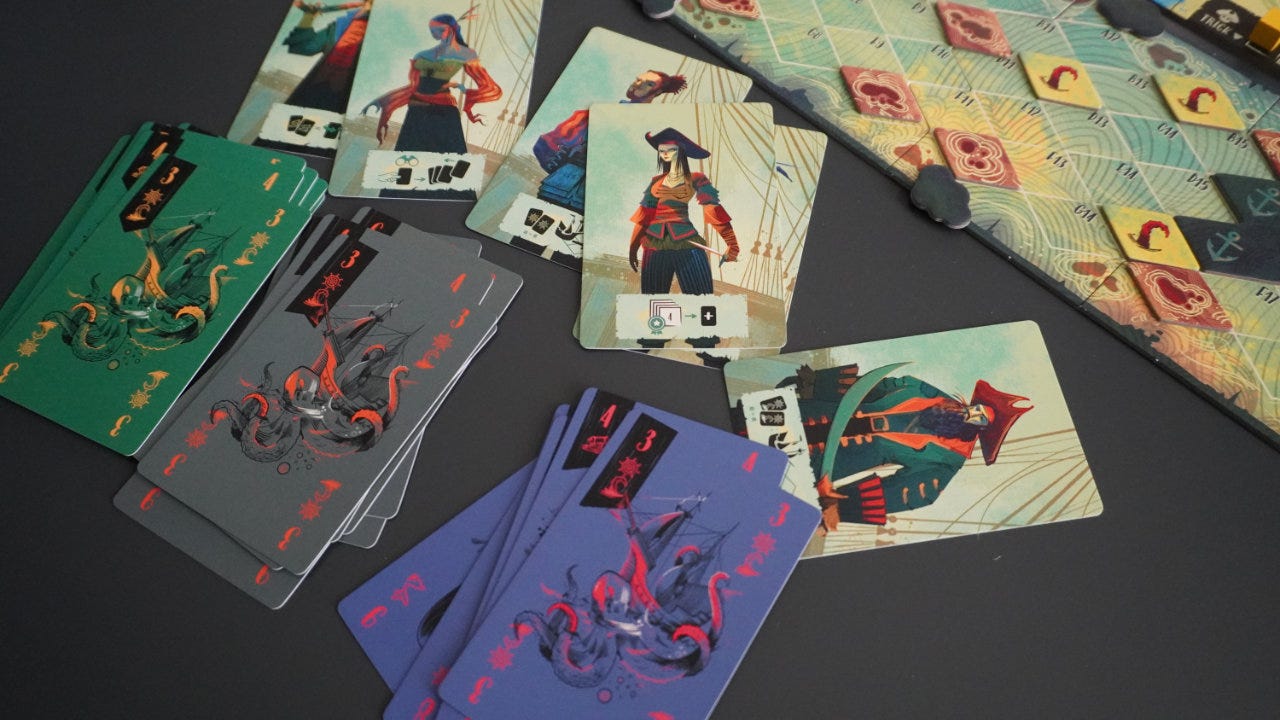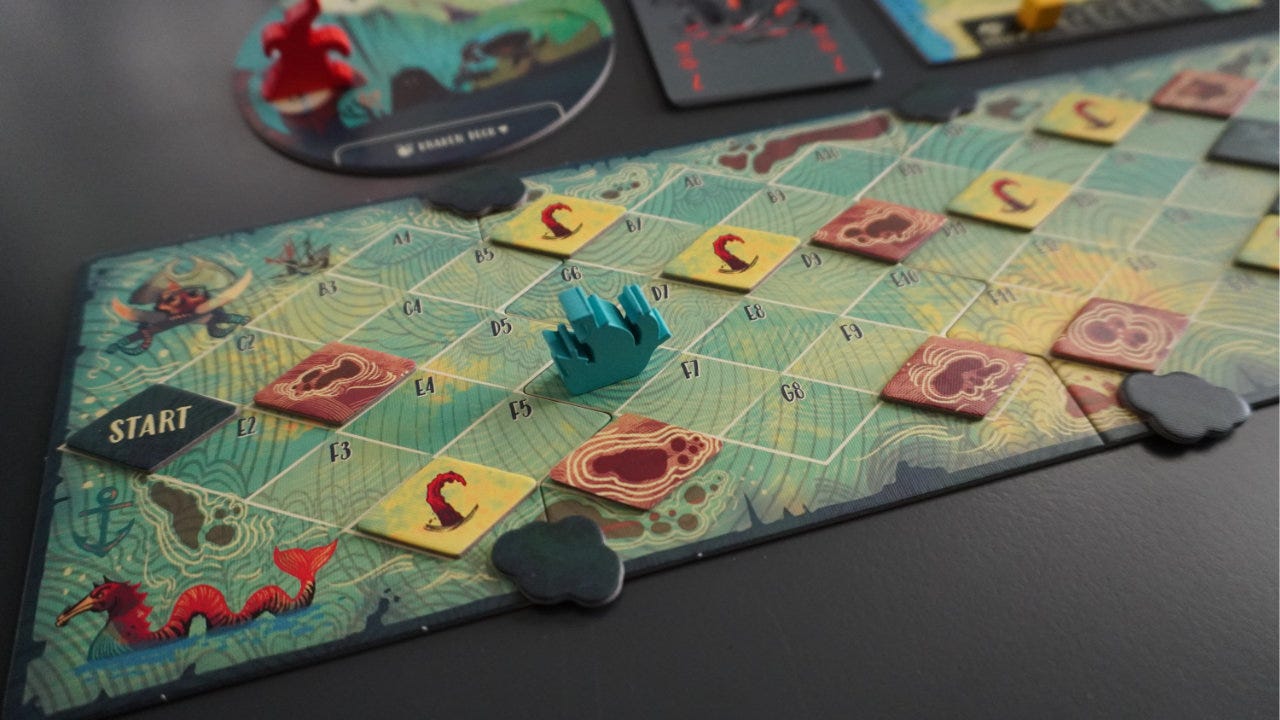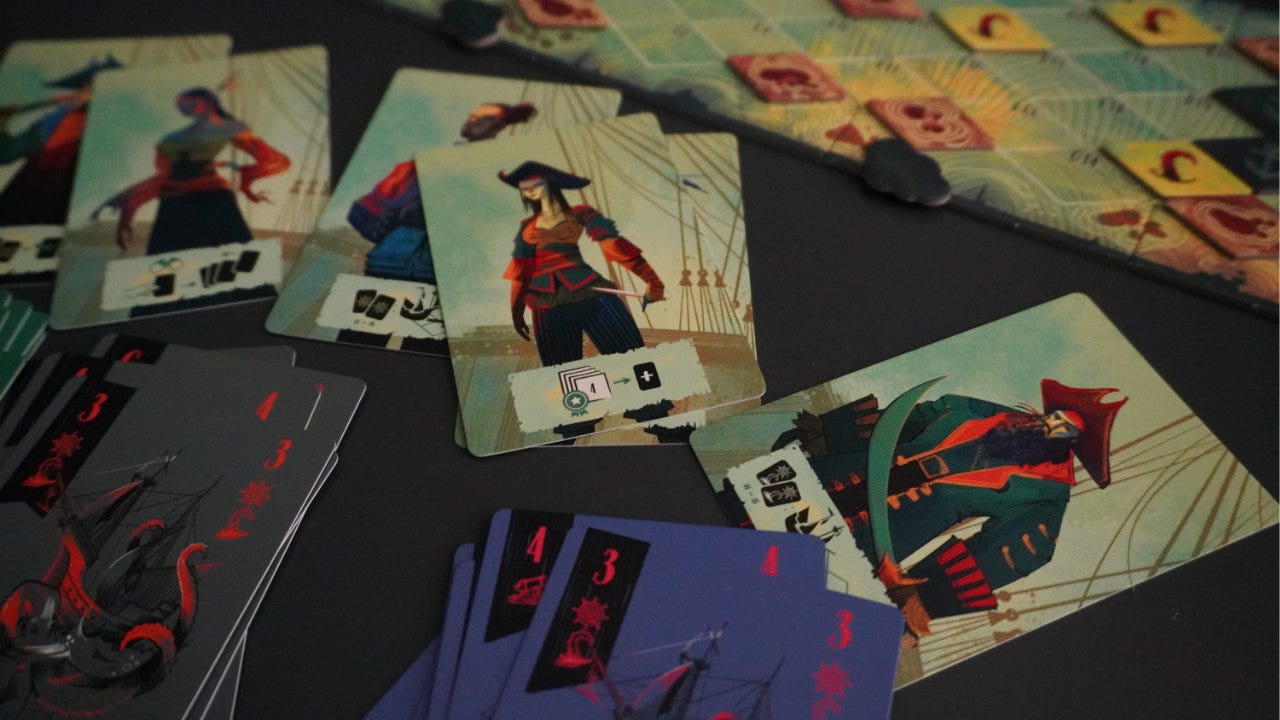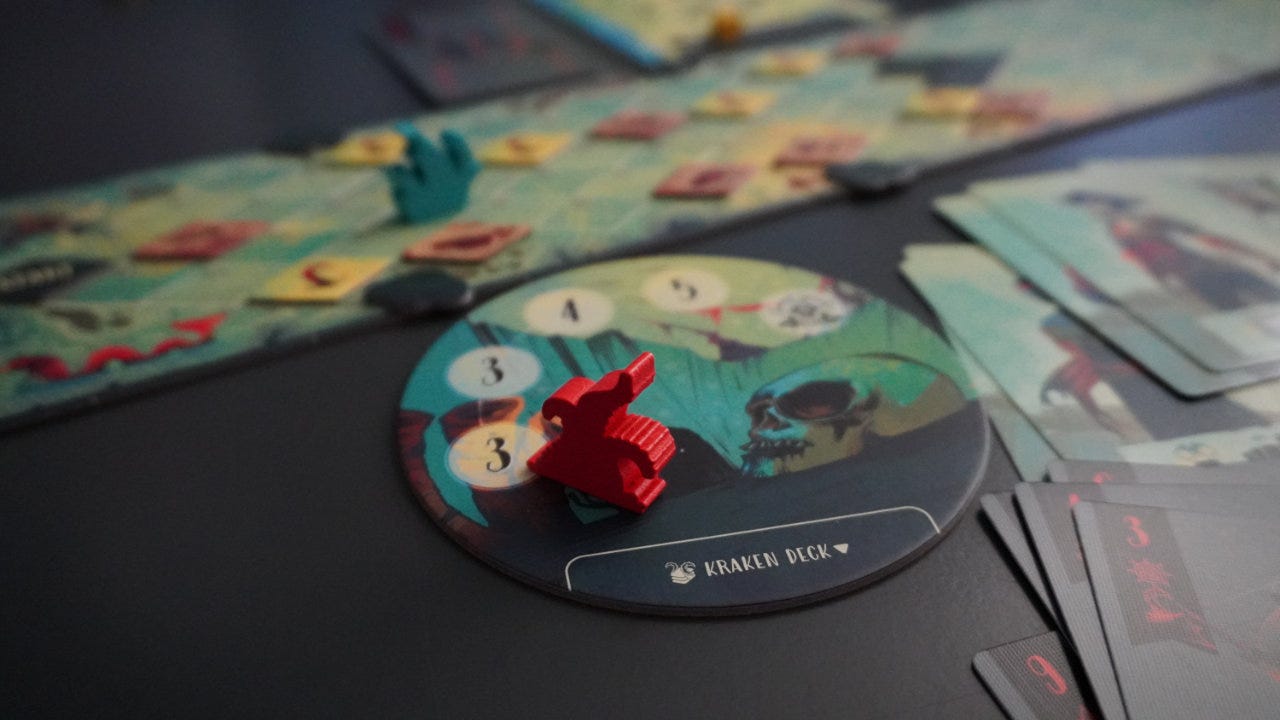Pirates, krakens, and trick-taking games
Exploring trick-taking mechanisms in thematic games like Sail
Welcome to Skeleton Code Machine, a weekly publication that explores tabletop game mechanisms. Spark your creativity as a game designer or enthusiast, and think differently about how games work. Check out Dungeon Dice and 8 Kinds of Fun to get started!
Last week we looked at Call to Adventure and how storytelling can be so powerful that it makes players take suboptimal turns. This week we are looking at a specific mechanism that shows up in a lot of popular games: trick-taking.
Nominate Skeleton Code Machine for a CRIT Award: The CRIT Awards are accepting nominations until May 31. If you enjoy reading Skeleton Code Machine each week, nominating it for "Best Blog or Article Written in the TTRPG Space" is a great way to show your support! Nominate Skeleton Code Machine!
Trick-taking games
Trick-taking games have existed for a long time, probably originating in China. Karnöffel is one of the earliest documented European trick-taking games, showing up in Bavarian municipal ordinances as early as 1426.
Having never played classic card games like whist, hearts, or pinochle, I’ve struggled to define trick-taking games. I knew you had to “win tricks” and there was usually a “trump suit” but that was about it.
Luckily BGG has a helpful definition of the trick-taking mechanism:
Players play cards from their hand to the table in a series of rounds, or “tricks” which are each evaluated separately to determine a winner and to apply other potential effects.
Beyond that, there are many variations and ways to both (a) win the tricks and (b) determine an overall winner.
Common elements
It’s impossible to exactly define a trick-taking game because they are all different. We can, however, consider some common elements or variations:
There is usually a “lead” suit that determines which cards can be played.
Tricks are often “taken” (i.e. won) by the highest value of the suit that was led.
Many games have a “trump” suit that wins regardless of card value.
Trump cards are randomly distributed, but sometimes acquired via bidding.
If you don’t have a matching card to “follow suit”, you must play another card from your hand.
The overall winner is based on number or value of “tricks taken” (i.e. won).
In some variations, the winner has taken the least number of tricks.
So a trick-taking game usually uses cards with suits and ranks, and play is done in finite rounds. Each round has someone who “wins” the round, but then an overall winner of the game is determined later.
Countless variations exist in how to win the rounds, what cards you are allowed to play, how much you can communicate, and how the game is won.
Rising Popularity
Trick-taking games have become extremely popular over recent years. In an Opinionated Gamers interview, designer David Parlett mentioned why that might be:
Trick-taking games are fast and decisive. A deal requires no more acts of play than the number of cards in your hand (unlike rummy games, which seem to go on for ever). After each trick you acquire more information about the cards remaining in play and can make appropriate judgments accordingly, especially in games where all the cards are in play.
There are currently 2,411 trick-taking games listed on BGG, ten of which are in the top 1,000 games. The most notable ones are The Crew: The Quest for Planet Nine (2019), The Crew: Mission Deep Sea (2021), Skull King (2013), Cat in the Box (2022), and The Fox in the Forest (2017).
Pirates vs. Kraken in Sail
Sail (Koryo & Yusei, 2023) is a co-op trick taking where players: “Navigate your pirate ship together through tricky waters and avoid the Kraken!”
The goal is to reach the destination token before either the end of five rounds or sustaining too much damage from the kraken.
There are a few things that make this two-player game really interesting:
A consistent nautical theme that is brought to life via art by Weberson Santiago.
The introduction of a map board with ship and hazards (e.g. islands/tentacles).
Variable player powers in the form of different pirate cards.
Actions are taken based on the symbols of the cards played into the trick.
For example, if both cards in the trick have the ship’s wheel on them, the ship will move forward. The direction it moves is toward the player who won the trick.
If there is a kraken tentacle on one of the cards, the ship takes damage in the form of discarding a card from a pile. There are also cannon and mermaid symbols that also have actions.
Thematic trick-taking games have been around for a while, such as Tournament at Camelot (2017) and Jekyll vs. Hyde (2021). Others just have a theme applied to an otherwise abstract game, as in Seas of Strife (2015). Either way, it’s an interesting area for exploration!
Trick-taking x Roleplaying?
An interesting area is the mixing of trick-taking into tabletop roleplaying games. I found a couple examples:
Blood//Rush
Blood//Rush by Rat Wave Game House:
BLOOD//RUSH is a fighting game ttrpg for two or three players using a deck of cards as a trick-taking game. You play the game as a series of rounds in the tournament, moving through characters and exploring the epic highs and lows of combat sport.
Each round is a trick, and each card suit/value has a move tied to it. Twos are hooks, threes are low kicks, fours are fast elbows, and so on. The “motif suit” determines which cards can be played when following suit. The Fight Card System, also by Rat Wave, generalizes this into a SRD.
A Dragon’s Hoard
A Dragon’s Hoard is a “trick-taking fantasy battle game” by Attusfalk:
You are heroes on your way to slay the dragon and claim its hoard. Create heroes and narrate the battle against the Dragon over several rounds of cooperative trick-taking; tactically alter your hand of cards to gain advantage, help your friends fight despite near fatal injuries, and together fight to overcome overwhelming odds.
There is a preparation phase where players can take narrative actions (e.g. “encourage a fellow adventurer”) to discard or swap cards. After that, one player takes the lead by playing a card. The dragon also plays cards. The winner of trick deals damage to the dragon, or everyone takes damage if the dragon wins.
Potential for other types of games
Trick-taking games are incredibly popular, and there seem to be more and more added to BGG every day. The fact that it has endured as a mechanism since at least 1426 means it’s here to stay.
It’s such a distinctive mechanism, however, that it might be hard to adapt for use in thematic games. The more restrictive a mechanism is, the harder it is to work into games like tabletop roleplaying games.
Still, games like Sail do a great job pushing those limits!
Conclusion
Some things to think about:
Trick-taking is popular: As a whole, trick-taking games have been around for a long time and modern designs keep getting better. It would be folly to ignore the trends and not consider if trick-taking is a good fit for your game.
Theme vs. mechanism: We’ve looked at theme vs. mechanism before both Inhuman Conditions and Tangled Blessings. It’s a tricky balance (no pun intended) when blending board games, card games, and TTRPGs.
Designers are doing interesting things: One of the things I enjoy about itch.io is that it allows indie designers to try weird ideas at low risk. Blood//Rush and A Dragon’s Hoard (noted above) are good examples.
What do you think? Does trick-taking have potential as a mechanism in highly thematic board games and/or TTRPGs?
— E.P. 💀
P.S. I’ll be at the Exeunt Press booth at MEPACON this weekend! Stop by and say hi!
Skeleton Code Machine is a production of Exeunt Press. All previous posts are in the Archive on the web. If you want to see what else is happening at Exeunt Press, check out the Exeunt Omnes newsletter.










A year and a half ago I published a trick-taking RPG called Inner Circle, about horrible people currying favour with someone even nastier. You can read details about it on the old kickstarter here https://www.kickstarter.com/projects/plane-sailing-games/inner-circle-rpg
or a summary on my website here https://planesailinggames.com/games/inner-circle/
Trick-taking games baffled me for a while, but it sorta clicked for me when playing an early version of Cole Wehrle's Arcs. The action theming for the different suits helps it mesh with people who aren't used to classic card games. Any discussion of trick-taking meets roleplaying should probably at least mention this soon-to-be juggernaut in the subgenre:
https://boardgamegeek.com/boardgame/359871/arcs
https://www.kickstarter.com/projects/2074786394/arcs/description